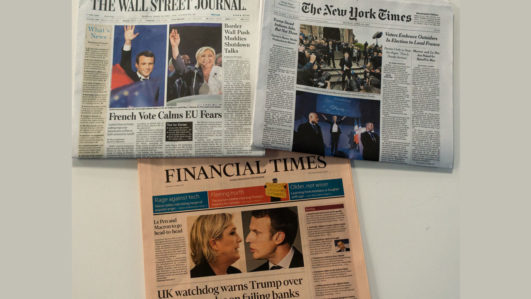French presidential candidates Emmanuel Macron and Marine Le Pen face off in a final televised debate on Wednesday which is expected to be bitter, personal and potentially decisive ahead of voting this weekend.
The stakes are high ahead of the contest between the pro-European Macron, a 39-year-old former investment banker, and far-right leader Le Pen, the 48-year-old scion of the National Front party.
Their starkly different views on Europe, immigration, the economy and French identity will be explored for the first time face-to-face, after a week marked by bruising clashes between them.
Polls show Macron holding a hefty but narrowing lead in the polls of 59 percent versus 41 percent, but previous debates during the rollercoaster French campaign have quickly shifted public opinion.
“Our goal is to avoid being dragged into mud-slinging,” an aide to Macron told AFP on condition of anonymity ahead of the two hours and 20 minutes of exchanges between the candidates.
Whatever the outcome, the event marks a new step into the mainstream for Le Pen, whose party was once considered by France’s political establishment to be an extremist fringe of racists that should be boycotted.
When her father Jean-Marie made it into the final round of the presidential election in 2002, his conservative opponent Jacques Chirac refused to debate him out of fear of “normalising hate and intolerance”.
Fifteen years later, Le Pen scored 21.3 percent in the first round of the French election on April 23 after successfully softening the FN’s image — but without fully removing doubt about the party’s core beliefs.
She has consistently sought to paint her rival as the continuation of the unpopular Socialist President Francois Hollande and an advocate of unbridled globalisation, the financial sector and immigration.
“If he finds himself in difficulty, he can always ask Francois Hollande to come and hold his hand. I won’t complain,” Le Pen tweeted archly Tuesday, in a message signed by her personally.
With Le Pen trailing in the polls, the face-off will be her biggest chance in front of a television audience to impress millions of views or induce an error by her opponent that could tilt the election in her favour.
– Euro in spotlight –
Macron, who was economy minister under Hollande, is expected to be wary of making mistakes but has signalled his intention to take on Le Pen and challenge what he calls her “dangerous” ideas to tackle the country’s deep economic and social problems.
“I want to go head-to-head, to get to the bottom of the issues, to show that these are false solutions,” the independent centrist told BFM television Tuesday.
Recent doubt about Le Pen’s stance on withdrawing France from the euro common currency could also give him an opportunity to target what is seen as a risky and unpopular policy by many voters.
“Macron would do well to put maximum emphasis on the EU issue in the debate, especially the currency,” veteran political analyst Philippe Braud told AFP. “It’s the issue that causes the most concern, especially for businesses. It’s not for love of Europe.”
– ‘Smokescreen’ –
Le Pen said Sunday that a new franc would be introduced for daily use while the euro would be retained for “large companies who trade internationally”.
“The franc to buy your baguette and the euro for multinationals… it’s not so much backtracking but a smokescreen in the last days of the campaign,” wrote journalist Jacques-Olivier Martin in the daily Le Figaro on Wednesday.
In the face of the attacks on Macron’s background as a highly educated civil servant and banker, he is expected to emphasise his personal story as a self-made man born to two doctors in provincial Amiens.
“I wasn’t born in a chateau,” he said this week, alluding to the Le Pen family mansion on the outskirts of Paris where Marine and her sisters were brought up.
Sparks flew when they faced each other in the presidential debates before the first round of voting, when Le Pen memorably accused Macron of waffling for seven minutes and saying nothing.
Macron said she was transforming France’s millions of Muslims into “enemies of the republic”.
Braud, the political analyst, said Wednesday’s debate “will probably be a draw”.
The duel could change some minds “if one or the other is outclassed, but I doubt it. Both will be sharp and effective, and the debate will serve mainly to reassure those who are already convinced.”
Guardian
This page has been viewed 349 times


























